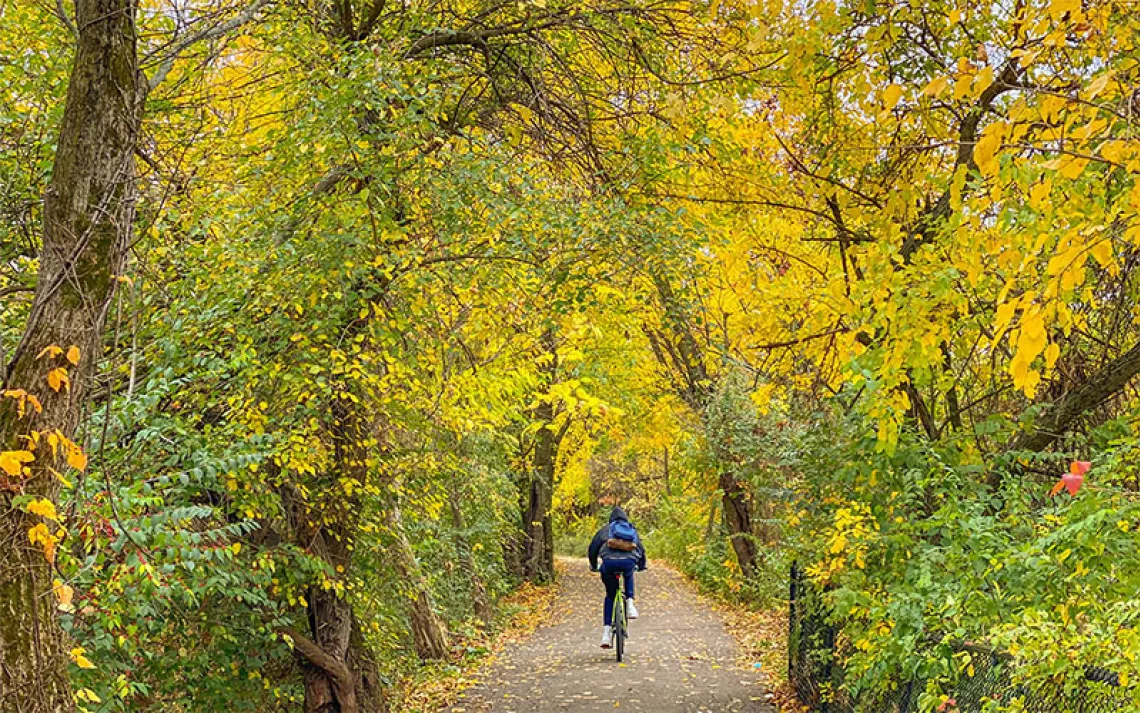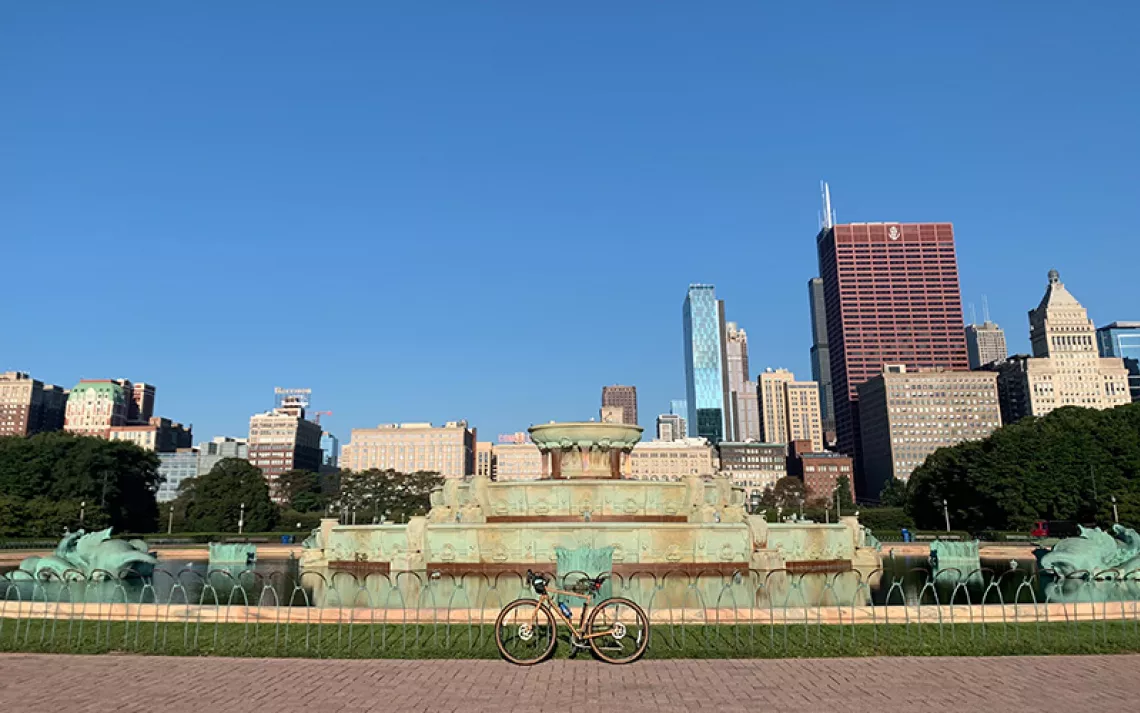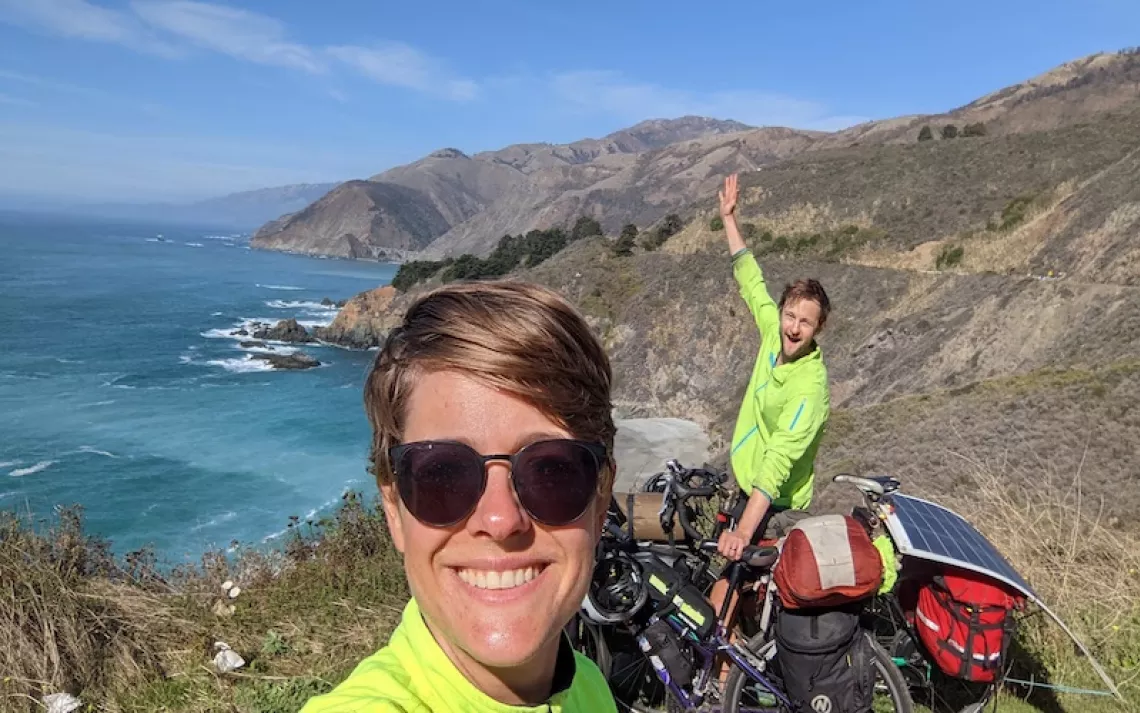One Woman’s Two-Wheeled Escape From Iran to North America
As Maria Rasouli learned, there’s no shame in cycling in a skirt

It was almost 30 years ago that Maria Rasouli and her best friend, Eli, set out on bikes together, exploring their rural neighborhood in northern Iran. Two girls, one bike. Maria took the pedals and Eli balanced atop the handlebars. Joyful and free, they’d ride laps, past boys playing soccer, through fields, and to the forest just beyond the village. “I’d pedal as fast as possible for the thrill of the wind in our faces,” recalls Rasouli. “Exploring the world on my bicycle was my childhood definition of freedom.”
And then, as happens to all bike-riding kids, a tumble. A tame one but enough for Eli to land with her skirt over her head. The girls laughed until an older man stopped to tell Eli, “My daughter, you are a grown-up woman. Getting on a bicycle in a skirt is inappropriate, especially around these young men. Go home and wear proper clothing. The two of you are women and should not be on a bicycle.” Maria Rasouli and Eli were 11 years old.
After hearing what happened, the girls’ families agreed, and Rasouli’s bike was forbidden from her use and given to her brother. “That was the moment that it felt like individual freedom was taken away from me,” recalls Rasouli. She never forgot how quickly her friend’s smile was replaced by a look of shame.
Twelve years later, Maria moved to Ottawa, Canada, on a scholarship to the local university, and got back on a bike for the first time since that long-ago tumble. That bike, her six-foot-tall professor’s, was too big, and her feet barely touched the pedals. Still, that same feeling of joy and freedom came back, instant and powerful.
“When I came [to Ottawa], that’s all I wanted to do for the first 10 years. I never had a car; I biked everywhere,” says Rasouli. And she rode that too-big, hand-me-down bike for a month before getting her own purple one. Today, Rasouli has 80 bikes.
Her fleet is part of the company she started, Escape Bicycle Tours and Rentals. The name, of course, is apt; biking has always functioned as a kind of escape for Rasouli, first in Iran and then again in Canada. After arriving in Ottawa, she explored so much of the city by pedaling that staying still in her academic work—she was pursuing a PhD in organizational psychology and teaching MBA classes at Carleton University—was no longer enough. “I did my PhD, I did work for the university, I did consulting, … but I constantly thought, 'What do I want to do that makes me happy?' And I always came back to this childhood memory, that I was happiest on my bike,” says Rasouli. “I want to be on a bike all the time. What can I do? How can I do this?”

With close to 500 miles of designated bike and shared pathways, Canada’s capital, she realized, was ideal for a business built on biking. It has one of the oldest and largest bicycle clubs in the country, alongside a strong advocacy group in Bike Ottawa’s Citizens for Safe Cycling, and the city recently developed a series of free, self-guided bike maps. There’s also a long tradition, almost 50 years now, of “Sunday Bikedays,” when certain roads are closed to motorized vehicles for cyclists. Starting with 20 bikes, Rasouli rented them out of a trailer and gave tours of her adopted city, sharing little-known parts of it that she’d discovered by bike, like Ottawa’s Fletcher Wildlife Refuge, where land is left to be “free,” as Rasouli describes the wee bit of garden tended by volunteers. “Their motto is they want to create an environment where wildlife can live freely,” she says.
Such freedom is dear to Rasouli, who had to work hard to gain hers back after losing her bike in Iran. “I threw myself into school, replacing the physical freedom of my bicycle with the freedom found inside books. Reading became my escape.” Rasouli excelled academically and received the scholarship that allowed her to come to Canada. “That’s the only way for a woman to be free in Iran. Either you have to be religious and follow the norms, or if you are a good student, they let you be.” Being a “nerd,” as she describes herself, gave her another way to be free after her bike was taken away.
But it’s the freedom—or “escape”—of two wheels that Rasouli most wants to share with others who might be timid or nervous about cycling. To this end, her bikes don’t have drop-down handlebars (less intimidating), and her guides ride hybrid bikes and are mostly retired, long-time Ottawa residents (also less intimidating). She’s also adding e-bikes as a means of empowering older participants. “Everyone is welcome,” she says; no one needs to be “super fit.” People who haven’t been on a bike in 10 years join her tours and then tell Rasouli that they’ll get their own bike and do a cycling tour in every city they visit. “That’s a change in attitude and behavior, and that is my goal. . . . I want to see this kind of transformation in people’s minds.”

And, she spurs it every day. As an outspoken advocate for biking and access in the community, Rasouli has served as director at large of the Bike Ottawa Board. She’s also been given the city’s Immigrant Entrepreneur Award; after all, her business has grown from that original trailer into a brick-and-mortar space (shared with a bike-repair service) on one of downtown Ottawa’s busiest pedestrian streets.
This year, her plan is to open a larger shop with a cafe and facilitate an even more communal vibe. Once Maria Rasouli got back on a bike, she never got off—and shows no signs of ever doing so.
 The Magazine of The Sierra Club
The Magazine of The Sierra Club



